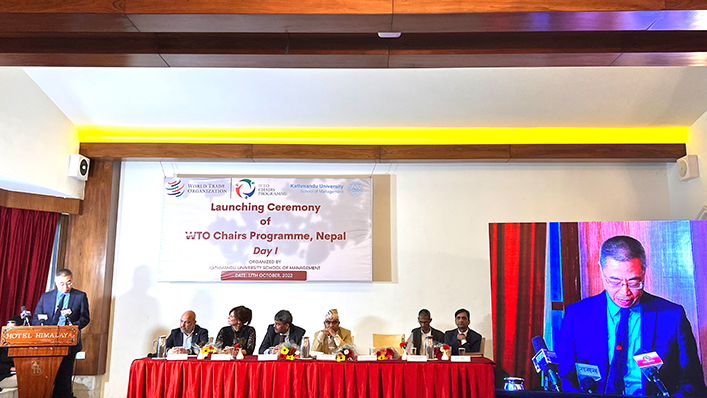
On the occasion of the launch, the Prime Minister of Nepal, Sher Bahadur Deuba, lauded the Chairs Programme as “an important brick” in the country’s efforts to address trade constraints. “I am confident that participation of all key stakeholders including the government, academia, private sector and civil society in implementing the WCP (in Nepal) and supporting the trade and investment policy formulation with both academic and applied research will bring about desired results towards addressing the alarmingly wide trade deficit of Nepal,” he said.
Minister for Industry, Commerce and Supplies Dilendra Prasad Badu congratulated KUSOM. In a written message, he said: “The selection of Kathmandu University is indeed a matter of pride for Nepal and I, as the minister concerned, would like to assure the Government of Nepal’s full cooperation in implementing the WCP and making full use of all pragmatic research outcomes expected from the Programme.”
Commending the WCP as “an excellent alliance between WTO members and the WTO Secretariat”, Chief Secretary of Nepal Shankar Das Bairagi emphasised the value of the WCP in allowing developing countries to “plug into their economies’ programmes, activities and services, which are critical to their progress and to manoeuvre dynamic issues involved in international trade while (building) connections between ideas in the academic domain and the world of international trade.”
On behalf of WCP donors, Australian Ambassador to Nepal Felicity Volk pointed to the Programme’s success in establishing itself as a powerful tool to build capacity among policy communities in both developing and least developed countries and in providing a forum for Chairs to develop policy solutions to collective challenges in global trade. She added that Nepal is “a powerful voice on issues affecting developing and least developed countries” and “a constructive partner for WTO members as they seek to reinforce the system that underpins global economic and political security.”
The Republic of Korea’s Deputy Permanent Representative to the WTO Jung Sung Park noted Nepal’s active contribution to the WTO-based multilateral trading system despite its limited presence in Geneva. Highlighting the growing representation of LDCs in the WCP Network, he said: “Nepal is a tireless champion of causes that are dear to LDCs and landlocked LDCs. Helping facilitate a smooth transition for graduated LDCs is but one example of Nepal’s contributions.” He also expressed the hope that KUSOM, as a business school, will make sure “Nepali businesses are not only well-integrated to global value chains but also connected in a sustainable way.”
Austrian Director-General for Digital and Economic Affairs Cynthia Zimmermann underscored the synergies generated by the WCP network across different regions and noted the network’s potential role in contributing to Nepal’s economic recovery and addressing its unique set of challenges through trade.
President of the Federation of Nepalese Chambers of Commerce and Industry Shekhar Golchha encouraged the private sector, academia and government to join efforts in identifying bottlenecks in trade and solving the problems together. He expressed confidence that the activities undertaken by KUSOM will ensure benefits are shared by all actors in trade.
WCP Advisory Board Member Désirée van Gorp welcomed KUSOM’s proposed activities and programmes under the WCP, with their focus on assisting young people, farmers and disadvantaged communities in their efforts to participate in global trade.
DDG Zhang opened the panel discussions on 18 October featuring trade experts from Nepal and Geneva. Topics on the agenda related to the linkages between the WTO and Nepal’s trade regime, trade challenges for landlocked LDCs, and the critical issue of food security — notably the challenges on net food importing developing countries and the opportunities presented by trade.
The WCP seeks to foster knowledge and expertise through institutions who provide evidence-based research supporting policy formulation and action in developing and least developed countries. KUSOM is among the 36 institutions that participate in the Programme.
Share
Reach us to explore global export and import deals